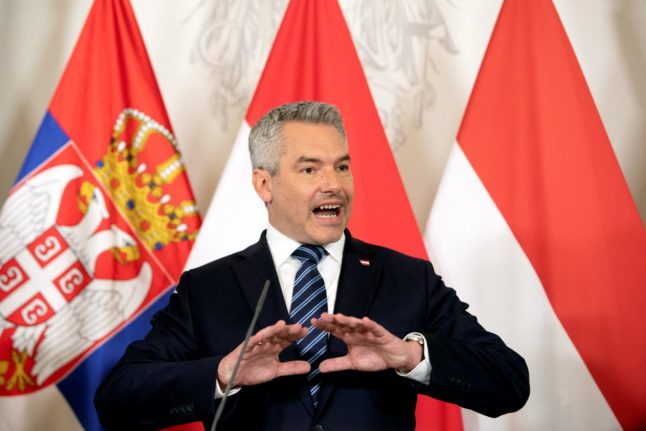Medical doctors are in high demand all over the world, especially as the coronavirus pandemic showed us how much we are short-staffed in the health sector.
In Austria, it’s no different, and the federal government has already announced several measures to attract people to its health sector in the future.
READ ALSO: More pay and longer holidays: How Austria hopes to attract 75,000 new nurses
Among the measures are changes to its Red-White-Red residence permits, those that, for example, allow workers, including in shortage occupations, to immigrate to Austria on a work visa.
Things will get easier for many IT employees, engineers, and tourist sector workers, but in some sectors, including the health one, there are a few more hurdles before starting working.
READ ALSO: How Austria is making it easier for non-EU workers to get residence permits
When it comes to medical activities, even European citizens who already have a right to live and work in Austria might need to go through a process to get their education certified and valid to start a medical practice in the country.
The process will depend primarily on where your training has taken place and what type of medical activity you intend on doing. All details can be found on the Austrian Medical Association (Österreische Ärztekammer).
General requirements for medical practice
In order to take up a medical practice in Austria, every physician (doctor, specialist, or general practitioner) needs to register with the Ärztekammer and meet the general legal requirements.
These include having full legal capacity concerning professional practice, good character and reputation required for fulfilling professional duties, fitness to practice needed for completing professional responsibilities, sufficient knowledge of the German language and legal residence giving access to the labour market.
READ ALSO: Everything foreigners need to know about the Austrian healthcare system
There are also specific requirements that need to be met depending on where your training took place.
Training took place within the EEA or in Switzerland
In this case, the process tends to be a bit easier, and you need to provide evidence of your basic medical training and any specific or specialist training you might have. For that, a diploma for medical study issued by an EEA member state of Switzerland will work.
You can check whether your documents are eligible for automatic recognition in Austria by emailing the Austrian Medical Association at [email protected].
Medical training outside the EEA (but recognised)
If you have had medical training outside of the EEA or Switzerland, but your training has been recognised by one of these states, the rules are also a bit different. You must show evidence of the medical activity and proof of its recognition.
Additionally, you must be authorised to independent medical practice in the country that recognised your education and has at least three years of actual and lawful professional experience in that country to have your training recognised through a non-automatic recognition of third country diplomas process.
You need to contact the International Affairs Team of the Austrian Medical Association ([email protected]) to get more information.
Medical training done in a third country
If you have completed your medical training in a third country and do not fulfil the requirements for a non-automatic recognition (above), you must first have your university degree recognised as equivalent by an Austrian university.
This process is known as Nostrifizierung.
In Austria, the Nostrifizierung procedure is done by the medical universities (Vienna, Graz or Innsbruck) with similar processes. In Vienna, you need to submit an application form, an education history for the comparison between the Curriculum taken and the one offered in Austria, and a possible “random test”.
Among the documents to be submitted in the application process is proof that you have a B2 level of German, a document from the Ärztekammer that you are required to go through the Nostrifizierung process and a confirmation that you paid the €150 fee. You can find a list of all documents you’ll need to submit here.
READ ALSO: Six things to know about visiting a doctor in Austria
The universities will then “investigate” if your education is equivalent to the one offered in Austria. The first step is a curriculum comparison (checking for both content and hours of classes), but they may also carry out a “random test” in some cases.
The test will be in German, but the participants selected will be allowed to use a language dictionary – the test results are only a part of the nostrification process and help the universities assess if the candidate’s training is equivalent to an Austrian one.
After you go through the recognition processes (Nostrifizierung), you can register with the Austrian Medical Chamber.
Registration with the Austrian Medical Association
Before starting medical practice in Austria, every person needs to register with the Austrian Medical Chamber. For this, they will need to send documents including proof of nationality, proof of lawful residence, a certificate of good standing from countries where they have practised medicine for more than six months within the last five years, a criminal record certificate, medical certificate (confirming physical and mental fitness to practice the medical profession) and more.
READ ALSO: EXPLAINED: How the Austrian healthcare system works
The application for registration has to be filed with the Austrian Medical Chamber.
The Medical Chamber of the respective province where you plan to exercise the medical profession is available to further assist with this. You can arrange a meeting with them to clarify general questions about the process.



 Please whitelist us to continue reading.
Please whitelist us to continue reading.
Member comments